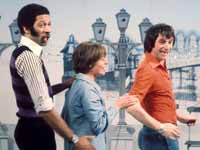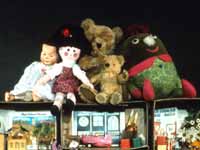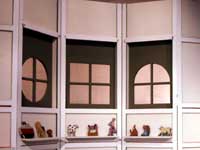 A television first. Unintentionally, Play School was the first ever programme broadcast on the then new network BBC2. A grand opening for the channel had been planned for the night before, but was scuppered by a power failure.
A television first. Unintentionally, Play School was the first ever programme broadcast on the then new network BBC2. A grand opening for the channel had been planned for the night before, but was scuppered by a power failure.
Ever enthusiasic presenters were the backbone of Play School. A different pair from the extensive roll call hosted the programme throughout each week, drawn from acting, teaching and performing backgrounds. Some of the biggest stars of children's TV did a stint on Play School, such as the dashing Brian Cant, sexy Floella Benjamin, loose limbed Derek Griffiths and all round superstar science boffin Johnny Ball.
The main quality a presenter had to have was a willingness to do anything, no matter how silly. Brian Cant recalled his audition:
"Joy Whitby was the lady who masterminded Play School. She kicked a box out from under her table and said 'Get in the box, and row out to sea'. I gathered myself together and rowed out to sea...I chuntered about in this box for a while and then went back into shore...She realised she'd got an idiot on her hands who would do almost anything they asked, and I think that's why I was in".
 The Toys. Play School presenters may have come and gone, but the toys were always there. They can still be viewed today at the National Museum of Photography, Film and Television at Bradford.
The Toys. Play School presenters may have come and gone, but the toys were always there. They can still be viewed today at the National Museum of Photography, Film and Television at Bradford.
There were five toys in total.
- Jemima the rag doll - "An empty headed bimbette" according to Fred Harris
- Humpty, a home-made-looking green egg thing - Harris thought he was "a bit rumbustious", and rather prone to falling over.
- Big Ted - rather "stodgy", but a great favourite with Eric Morecambe, who used to visit the toys when working in a nearby studio. Big Ted was a victim of crime, with the Play School team returning after lunch one day to find he had been stolen. A replacement was found, but the original Ted was never seen again.
- Little Ted - often overshadowed, but a good sort.
- Hamble the doll - the hate figure of the under-fives for the entire run of the programme.
Although it was originally a very common type of doll, sold in Woolworths, by the time Play School was in full flow there were only two Hambles in Britain. The other was owned by a woman in Chester, who would hire it to the BBC for �40 a week whenever the Play School regular was injured.
That happened quite often, as it wasn't just the audience who detested Hamble. None of the presenters could stand her either, so she'd get drop kicked across the studio, and once, when she wouldn't behave, Chloe Ashcroft took a dreadful liberty.
"I did a terrible thing to Hamble. She just would not sit up...so one day I got a very big knitting needle, a bit wooden one, and I stuck it right up her bum, as far as her head. So she was completely rigid, and she was much much better after that."
Hamble was the only toy not to make it through to the end, being replaced by black doll Poppy in an 80s attempt to be more inclusive. That's their story as to why she went, anyway...
 The Windows were the crowning glory of the programme, posing the question of which window it would be day after day. If you never worked it out, the theme of the programme decided which window it would be. If it was balloons or wheels, a trip through the round window was in store. If boxes or houses, the square window. Only arched things like fountains and er...arches gave the cue for the arched window, leading to it appearing least of all.
The Windows were the crowning glory of the programme, posing the question of which window it would be day after day. If you never worked it out, the theme of the programme decided which window it would be. If it was balloons or wheels, a trip through the round window was in store. If boxes or houses, the square window. Only arched things like fountains and er...arches gave the cue for the arched window, leading to it appearing least of all.
Never work with animals was advice ignored by Play School's producers. A steady stream of pets, including goldfish Bit and Bob, "The Mice" and unimaginatively named cockatoo Katoo were featured on the programme. All had their drawbacks - the goldfish were boring, and the mice and Katoo were vicious. In fact, Katoo actually made Johnny Ball swear on camera once as it took a chunk out of his finger.
Onto bigger things. Many Play School alumni went on to bigger and better things. Johnny Ball presented numerous series of brain boggling but interesting educational series in the '70s and '80s like Think of a Number and Think Again. A less well known presenter, Iain Laughlan, is the co-founder of The Tweenies. The man who probably had the biggest influence on children's viewing was Michael Cole, a writer and producer on the programme. After Play School he went on to create a cornucopia of programmes including Fingerbobs, Heads and Tails, Pidgeon Street, and with his wife, Bod.
Playing away. The Play School format was sold to many foreign broadcasters in a sort of kit form, including studio diagrams, stories and activity ideas. The Australian version, made by Channel Nine, survives even today, and Canadian tots show Polka Dot Shorts still reveals its Playschool-spin-off origin by the prescence of Teds and a Humpty.
One thing all the foreign broadcasters were agreed on was - no Hamble. Every single one dropped her.

